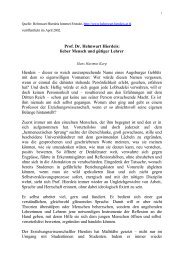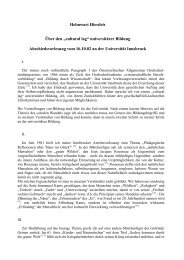Download pdf - Universität Innsbruck
Download pdf - Universität Innsbruck
Download pdf - Universität Innsbruck
Erfolgreiche ePaper selbst erstellen
Machen Sie aus Ihren PDF Publikationen ein blätterbares Flipbook mit unserer einzigartigen Google optimierten e-Paper Software.
Some of the social logics of sharing 53<br />
action” on the site. It would appear, therefore, that the Facebook blog under discussion<br />
makes explicit use of therapeutic language in the service of Facebook’s commercial<br />
agenda.<br />
However, there are also more subtle linkages made between sharing on Facebook and the<br />
therapeutic narrative in some of Facebook’s blogs and official pronouncements. This is<br />
how the Share button was described by Facebook, for instance: “The Share button enables<br />
you to take content from across the Web and share it with your friends on Facebook,<br />
where it can be re-shared over and over so the best and most interesting items get noticed<br />
by the people you care about.” 5 Of particular note here is the reference to “the people you<br />
care about”: Facebook is trying to harness the association between “sharing” and “caring.”<br />
It wants to borrow from the idea of sharing as constitutive of intimate relationships and<br />
reapply it to Facebook.<br />
While this is a basic mechanism of advertising, it nonetheless suggests how these new usages<br />
of “sharing” might be read. In particular, Facebook would appear to be using the<br />
word and exploiting our generally positive feelings toward sharing in order to mystify its<br />
business agenda—here, sharing is what Lackoff and Johnson (1980) call a “structural metaphor.”<br />
When a user posts something on their Facebook wall, that is called sharing. However,<br />
the process by which Facebook culls information from that user’s profile and Facebook<br />
activities is also called sharing. What is significant here is that what I “share” with<br />
Facebook is not the same information as I share with my friends. This, of course, is precisely<br />
what enables yet another relationship—that between Facebook and the advertisers<br />
who pay for space on its website. Here too the relationship is called “sharing,” as illustrated<br />
by this quote: “You can feel confident that Facebook will not share your personal<br />
information with advertisers unless and until you want to share that information.” 6 In sum,<br />
the identification of sharing with caring, and the use of a rhetoric of sharing to describe<br />
purely business relationships, suggest that the implications of sharing from the therapeutic<br />
narrative are indeed borrowed by Facebook in order to imbue that latter with some of the<br />
attributes of the former, such as intimacy, trust and equality.<br />
Conclusion<br />
We have now come full circle. In the introduction to this paper it was suggested that when<br />
we emically analyze the notion of sharing in a number of different spheres, we end up with<br />
something that is greater than the sum of its parts. In this concluding section I would like<br />
to substantiate this claim by putting forward three tentative propositions for further study.<br />
5 http://blog.facebook.com/blog.php?post=165161437130, accessed 23.8.2011.<br />
6 See http://blog.facebook.com/blog.php?post=101470352130, accessed 23.8.2011.
















